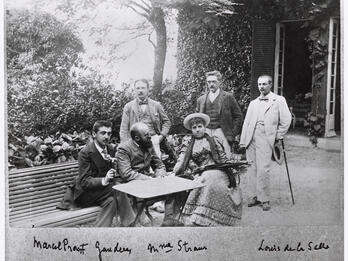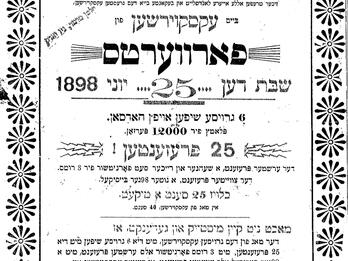History of the House of David
Sensitive Content
Prologue
The sultan thought for a moment and said, “I know, Jew, that your heart is not devoid of intelligence. After all, you want to live a long life in your household with your children. So, do not annoy me with lies, and tell me of your wealth and everything that is in your treasury!”
R. Judah replied, “My Lord! My innocence and integrity and fear of God are my good treasure, and my six beloved and pleasant offspring are all my choice wealth in the world. And except for them I am poorer than the destitute of the land and their portion in life.”
“Let them be yours alone,” the sultan answered, mocking him. “My eye is only on your money, and my soul desires to know where it is. For I know very well that you are richer than all the Jews of Morocco, and now, give me your treasure, for that is what I desire.”
“If a good name and honor are preferable to money, then I can boast that with the grace of my God, I am richer than the entire community of my people; but if silver and gold are all human wealth, then among your subjects you have rich people, owners of treasures, next to whom I am but nothing.”
“You are trying in vain to evade me, cursed Jew!” shouted the sultan in his anger. “I demand your money, and with it all the wealth of the rich men of your people. Since you are the head of them all, you know them all by name. Now, tell me everything, and do not conceal a thing, because your life depends on it.” [ . . . ]
“I told you already. I don’t know their names.”
“You don’t know them? But you do know me. And I have the power to force you to confess to me about all your wealth and also to call all the rich men in your community by name.” [ . . . ]
At a sign from the sultan, the executioner ordered his helpers to bind R. Judah in ropes and stretch him on the rack and torture him. R. Judah bore everything in silence, like a tame ram brought to slaughter, as though his soul had already flickered from the living world.
But it is superfluous to describe, for the reader, the horrible tortures that were inflicted upon R. Judah from the cruel sultan’s orders. It is enough to know that the torments were too severe for the old man to bear. His soul departed during the tortures and returned to heaven, to the place to where his eyes were raised throughout the ordeal.
***
All the Jews of Morocco donned mourning clothes when the bad news reached them, and everyone wailed and wept in public—because R. Judah was beloved and cherished and highly honored for his integrity, innocence, and his generous spirit that supported them when he was alive. On the fourth day of the [sultan’s] siege [on the mellah, the Jewish quarter], everyone rushed to prostrate themselves before the sultan with flattery, and they even paid an additional tax—to reconcile him to them and return R. Judah’s body, to lay it to rest in a Jewish grave. The next morning, R. Judah’s body was brought to rest, with his daughter and son-in-law in its wake. A huge crowd from all the holy fraternities gathered in front of his house, and everyone’s face was sad and furious. When the pallbearers arrived at that house from the sultan’s court, they placed it on the bed, and the ḥakham, the rabbi of the community, eulogized him properly. [ . . . ] When the rabbi finished speaking in praise of the deceased, recounting his righteousness and good deeds before him, he read the words of his testament before the entire community—because this was assigned to him by R. Judah while he was still alive—in which was the accounting of his wealth and the division among his heirs, and his great generosities in all matters of charity and all the holy fraternities, and finally a marvelous thing was found written in it, as follows:
Since the First Temple was destroyed, it has been a perpetual rule in our family, that every one of the fathers in each generation should write his life story as a memorial, and he should entrust it to one of his sons, whom he should choose, and he should make him swear to obey the law and do as he had done. And may the Lord who chose David as His servant protect his sons after him, lest they are forgotten, and these memorials are preserved from generation to generation to this day. All the words are written in Hebrew scrolls that are assembled together in a closed room, which I have consecrated to their preservation. [ . . . ] It is my fervent hope and desire that they should be a treasure for all the members of my people, because aside from family memories, they also have many worthy matters to be recalled in the history of our nation. Therefore, I begged the ḥakham of our community that after my death he should take these scrolls and copy them in ordinary writing and print them in small booklets, to make it easy to divide them among Jacob and disseminate them among Israel (Genesis 49:7). And all the scrolls, after they have been copied, one by one, will be returned to my eldest son Joel. And I direct this son of mine to preserve them and do as his forefathers did, and to add his part to them as well, with all the events that will occur to him and to his people during his days. [ . . . ]
After the funeral, which was carried out properly, the rabbi brought the scrolls to his home, to do the will of the deceased. The copying into ordinary script was done by expert hands, and the scrolls were returned to their owner.
But the many troubles that continued to afflict the Jews in Morocco prevented the rabbi from having them printed. In the meantime, the family of Judah Abarbanel left Morocco, and it is no longer known where they are. The rabbi, too, went the way of all flesh, and the booklets remained as they were [i.e., in manuscript] and passed from hand to hand until they reached a traveler, one of our Ashkenazic brethren, in his voyages in these countries—and the words of the deceased are now fulfilled, as History of the House of David sees the light of day today in printed booklets.
Translated by
.
Credits
Avraham S. Friedberg, Zikhronot le-bet David: Kovets sipurim me-divre yeme Yisra’el [History of the House of David] (Warsaw: Aḥiasaf, 1893), pp. 11–15.
Published in: The Posen Library of Jewish Culture and Civilization, vol. 7.




